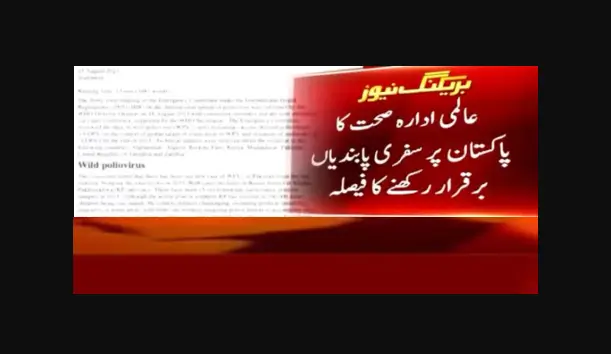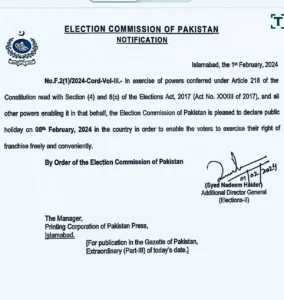WHO Issues Travel Restriction on Pakistan: Polio Outbreak
WHO Extends Travel Restrictions on Pakistan: Polio Threat Remains
The World Health Organization (WHO) has raised the alarm on Pakistan’s persistent polio threat, extending travel restrictions for another three months.
This decision comes after the Emergency Committee on Polio reviewed concerning trends in the country, including:
- Four new wild poliovirus (WPV1) cases reported in 2023, bringing the total to six.
- A significant increase in environmental detections of poliovirus, with 82 positive samples identified in 2023, including a surge of 60 between September and November.
- Emergence of new transmission areas in Quetta Block (Balochistan), Karachi (Sindh), and regions in Islamabad, Rawalpindi, and Peshawar (Khyber Pakhtunkhwa).
- Challenges to the polio eradication program:
- Political instability and insecurity in certain areas.
- Need for police escorts for frontline workers due to security concerns.
- Vaccination refusals in exchange for alternative services.
Despite some progress, such as vaccinating 160,000 more children in southern Khyber Pakhtunkhwa, these challenges underscore the need for continued vigilance and intensified efforts to stop the spread of polio in Pakistan.
Read More: NIH Affirms Surge in COVID-19 Cases
This extension of travel restrictions aims to:
- Protect travelers from the risk of contracting polio.
- Encourage Pakistan to address the gaps in its polio eradication program.
- Maintain pressure on the international community to support Pakistan’s efforts to eradicate polio.
The fight against polio in Pakistan is far from over.
By raising awareness, supporting vaccination efforts, and holding authorities accountable, we can work together to eliminate this devastating disease once and for all.
Read More: Pakistan to Receive New COVID-19 Vaccine from Pfizer
This unanimous decision by the Emergency Committee on Polio highlights the gravity of the situation and the need for continued vigilance.
Key Concerns:
- Pakistan’s ongoing polio transmission: Four new wild poliovirus cases in 2023 bring the total to six, and environmental detections have surged, indicating persistent circulation.
- Vulnerability of neighboring regions: Unvaccinated children in southern Afghanistan and ongoing transmission in eastern Afghanistan raise the risk of polio re-entering Pakistan.
Travel Advisory:
The WHO reiterates its recommendations for travelers:
- Be fully vaccinated against polio before visiting Pakistan.
- Residents and visitors staying over four weeks should receive an additional dose of polio vaccine (OPV or IPV) before travel.
Challenges and Continued Efforts:
- Political instability and security concerns hamper vaccination efforts in Pakistan.
- Vaccine hesitancy and refusal pose additional obstacles.
- Despite challenges, progress has been made, with 160,000 more children vaccinated in southern Khyber Pakhtunkhwa.
The extended travel advisory serves as a reminder that the fight against polio in Pakistan is ongoing. Collaborative efforts are crucial to address the challenges, protect travelers, and ultimately eradicate this devastating disease.
Note: The information above might not be accepted 100%. Please verify from your own sources. We will not be responsible for any kind of loss due to our content.
For more news, please visit Munafa Marketing.




